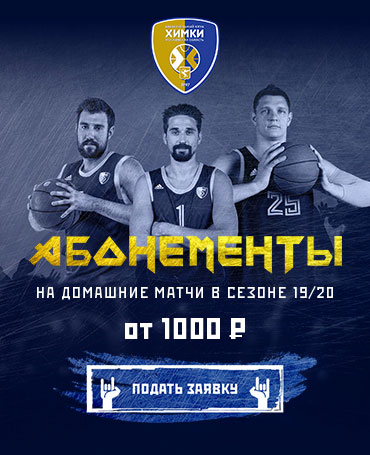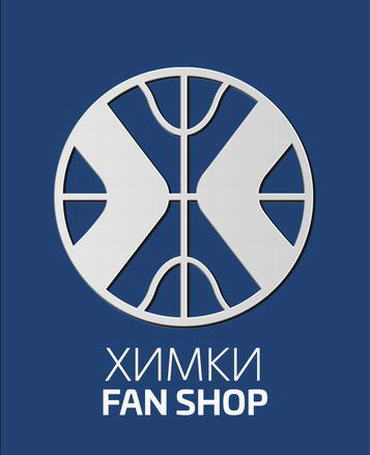Timofey Mozgov, BC Khimki Moscow Region 28 march 2009
Eurocup
Playing in his first European club competition ever, Timofey Mozgov has been one of the biggest discoveries of this season, making it all the way from BC Khimki Moscow Region's second team to become the Eurocup's best offensive rebounder in the Last 16.
The Russian center's season-average of 3.2 offensive and 7.1 overall rebounds are nothing but impressive, especially because he has been pulling them down in less than 18 minutes per game for Khimki, whose frontline is packed with well-known big men. But it is the 22-year old Mozgov who leads the team in both rebounds and blocks (1.2 per game). Having learned throughout his career that nothing comes easy, Mozgov stays humble, but is nevertheless full of ambitions for himself and Khimki: "Our quarterfinals against Pamesa Valencia is going to be very hard," he told Eurocupbasketball.com, "but I have big faith in our team and I am going to the Final Eight to win."
Mozgov grew up in Saint Petersburg, Russia's second biggest city, which is famous for its basketball traditions. The young Mozgov was discovered and introduced to the game by some of the country's best-known youth coaches. Kira Trzheskal, who turned a number of girls into national team players, including four-time Olympian Maria Stepanova, spotted the tall Mozgov, then a fourth-grader, at his school. She gave him a note with a time and a place, and soon Mozgov found himself on the court of the Admiralteyskaya sports school, surrounded by boys who already had been playing basketball for months or even yours under guidance of Gennadiy Panyutin. Interestingly, Mozgov's current Khimki teammate Anton Ponkrashov was one of those boys. As Mozgov remembers, his new teammates were way ahead of him at that time. "Ponkrashov and the other guys have already learned a lot of basic skills and could shoot the ball," he says. "I was the team's worst player and had to learn everything from the beginning."
Mozgov worked hard to catch up with the other boys, but a couple years later his family moved to Krasnodar, which for him meant a stop to serious basketball training. Though he practiced and played for the local school from time to time, there was no professional coach around and Mozgov was more or less out of basketball for several years. But he wanted to play, and his desire and size brought him back to St.Petersburg in 2001. Coach Anatoliy Shteinbok accepted Mozgov to his famous boarding school, where players like Mikhail Mikhailov, Andrey Fetisov, Sergey Panov, Zakhar Pashutin, Andrey Kirilenko and many others practiced as teenagers. At 15, Mozgov left his parents and headed back to his native city, pursuing his basketball dream.
Once again, most of Mozgov's teammates were much better than him, but he tried to catch up with them, doing his best day after day, month after month. After finishing school, Mozgov stayed in St.Petersburg and continued to play under Shteinbok, who was also in charge of the "Konti" team that competed in the Russian third-best league. In Konti, Mozgov reunited with Ponkrashov, but while the latter left the team to play in the Russian League in 2004, Mozgov stayed for three seasons, until 2006. By that time, Mozgov had become a team leader, and Coach Shteinbok told Mozgov it was time to move on: "First I went to some tryouts in Samara that didn't work out, but when I came back, Shteinbok told me to pack my stuff once again and go to Khimki," Mozgov recalls.
In that way, Mozgov suddenly found himself in one of Russia's elite clubs, but as always, his road to acknowledgment and playing time hasn't been easy. Though he made the cut to become part of the first team's roster, Mozgov only saw action a couple times, and by the end of the season was playing on Khimki's second team. Then, Mozgov spent the entire 2007-08 campaign on the second team and could only watch when Khimki won the Russian Cup or matched up against CSKA in the Russian League finals. But Mozgov doesn't feel too bad now about not being part of those big achievements, because he hasn't been wasting time: "I think it was better for me to have an opportunity to play a lot," he says. "Even though it was at a much lower level, it was a better chance to improve rather than just sit on the bench for the whole year."
This season, Mozgov was moved back to Khimki's first team, but didn't see much playing time until Sergio Scariolo took over as the team's new head coach. With Maciej Lampe down with an injury, Scariolo called Mozgov's number in a crucial home game against Besiktas Cola Turka, his first Eurocup game in charge of Khimki. "Our coach showed big trust in me, and I finally had a chance to try myself at the highest level," Mozgov says. He played up to the challenge and finished with 8 points and 8 rebounds in less than 11 minutes on the court. In his next two Eurocup games, Mozgov registered double-doubles with a combined 27 points and 26 rebounds. Mozgov continued to play solid in the Last 16, scoring a career-high 23 points against Panellinios BC to earn the honour of Eurocup MVP of the week.
Despite his recent success, Mozgov knows that he still has a lot of improvement to make, but he's sure that he can continue to grow in Khimki – by playing and practicing: "I am learning at every practice, in fact, it is tough for me at every practice," Mozgov admits. "Maciej (Lampe) and Ratko (Varda) are both very strong and skilful players who are giving me a hard time, but I am trying my best every time."
Having never had a chance to play at such a high level before, Mozgov looks very much forward to the Final Eight in Torino and hopes that his team still will be there on the day of the final game: "I don't know what I want to accomplish in five or 10 years, but I know what I want to accomplish in 10 days," Mozgov says with a laugh. "I want to win the Eurocup."
Andrei Kazankov, Eurocupbasketball.com
Mozgov grew up in Saint Petersburg, Russia's second biggest city, which is famous for its basketball traditions. The young Mozgov was discovered and introduced to the game by some of the country's best-known youth coaches. Kira Trzheskal, who turned a number of girls into national team players, including four-time Olympian Maria Stepanova, spotted the tall Mozgov, then a fourth-grader, at his school. She gave him a note with a time and a place, and soon Mozgov found himself on the court of the Admiralteyskaya sports school, surrounded by boys who already had been playing basketball for months or even yours under guidance of Gennadiy Panyutin. Interestingly, Mozgov's current Khimki teammate Anton Ponkrashov was one of those boys. As Mozgov remembers, his new teammates were way ahead of him at that time. "Ponkrashov and the other guys have already learned a lot of basic skills and could shoot the ball," he says. "I was the team's worst player and had to learn everything from the beginning."
Mozgov worked hard to catch up with the other boys, but a couple years later his family moved to Krasnodar, which for him meant a stop to serious basketball training. Though he practiced and played for the local school from time to time, there was no professional coach around and Mozgov was more or less out of basketball for several years. But he wanted to play, and his desire and size brought him back to St.Petersburg in 2001. Coach Anatoliy Shteinbok accepted Mozgov to his famous boarding school, where players like Mikhail Mikhailov, Andrey Fetisov, Sergey Panov, Zakhar Pashutin, Andrey Kirilenko and many others practiced as teenagers. At 15, Mozgov left his parents and headed back to his native city, pursuing his basketball dream.
Once again, most of Mozgov's teammates were much better than him, but he tried to catch up with them, doing his best day after day, month after month. After finishing school, Mozgov stayed in St.Petersburg and continued to play under Shteinbok, who was also in charge of the "Konti" team that competed in the Russian third-best league. In Konti, Mozgov reunited with Ponkrashov, but while the latter left the team to play in the Russian League in 2004, Mozgov stayed for three seasons, until 2006. By that time, Mozgov had become a team leader, and Coach Shteinbok told Mozgov it was time to move on: "First I went to some tryouts in Samara that didn't work out, but when I came back, Shteinbok told me to pack my stuff once again and go to Khimki," Mozgov recalls.
In that way, Mozgov suddenly found himself in one of Russia's elite clubs, but as always, his road to acknowledgment and playing time hasn't been easy. Though he made the cut to become part of the first team's roster, Mozgov only saw action a couple times, and by the end of the season was playing on Khimki's second team. Then, Mozgov spent the entire 2007-08 campaign on the second team and could only watch when Khimki won the Russian Cup or matched up against CSKA in the Russian League finals. But Mozgov doesn't feel too bad now about not being part of those big achievements, because he hasn't been wasting time: "I think it was better for me to have an opportunity to play a lot," he says. "Even though it was at a much lower level, it was a better chance to improve rather than just sit on the bench for the whole year."
This season, Mozgov was moved back to Khimki's first team, but didn't see much playing time until Sergio Scariolo took over as the team's new head coach. With Maciej Lampe down with an injury, Scariolo called Mozgov's number in a crucial home game against Besiktas Cola Turka, his first Eurocup game in charge of Khimki. "Our coach showed big trust in me, and I finally had a chance to try myself at the highest level," Mozgov says. He played up to the challenge and finished with 8 points and 8 rebounds in less than 11 minutes on the court. In his next two Eurocup games, Mozgov registered double-doubles with a combined 27 points and 26 rebounds. Mozgov continued to play solid in the Last 16, scoring a career-high 23 points against Panellinios BC to earn the honour of Eurocup MVP of the week.
Despite his recent success, Mozgov knows that he still has a lot of improvement to make, but he's sure that he can continue to grow in Khimki – by playing and practicing: "I am learning at every practice, in fact, it is tough for me at every practice," Mozgov admits. "Maciej (Lampe) and Ratko (Varda) are both very strong and skilful players who are giving me a hard time, but I am trying my best every time."
Having never had a chance to play at such a high level before, Mozgov looks very much forward to the Final Eight in Torino and hopes that his team still will be there on the day of the final game: "I don't know what I want to accomplish in five or 10 years, but I know what I want to accomplish in 10 days," Mozgov says with a laugh. "I want to win the Eurocup."
Andrei Kazankov, Eurocupbasketball.com
Source
http://www.eurocupbasketball.com/ulebcup/home/news/player...



